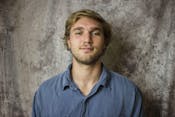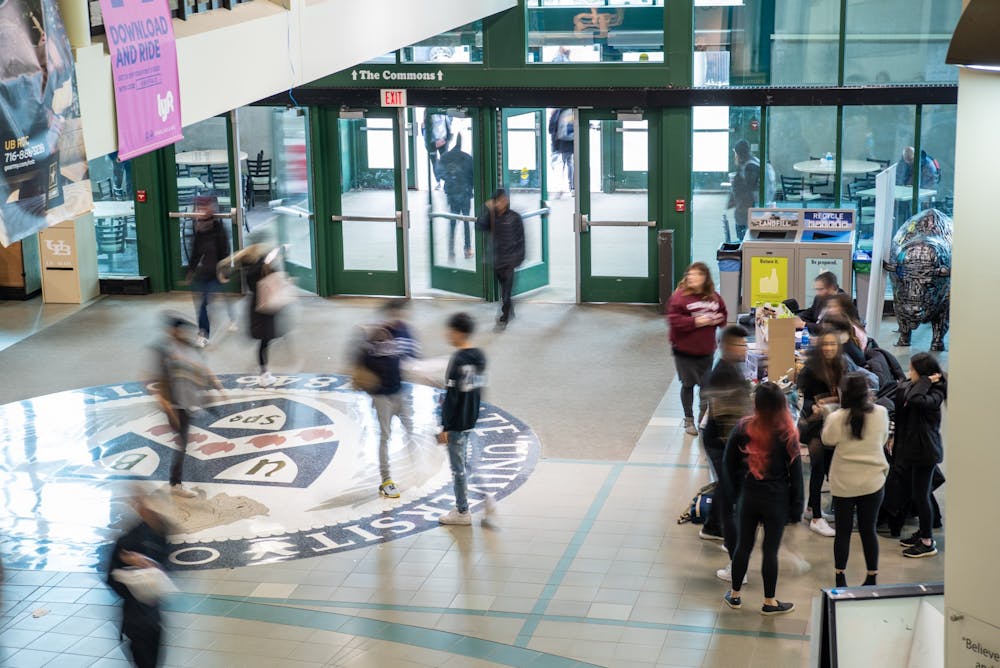Bella Chen* notices when people glare at the surgical mask she started wearing after her trip to the Hubei province in China this winter. She says the looks are hurtful and add to what is already a stressful situation.
Chen, a UB student, traveled to the province to visit family this winter. She returned just before the Chinese government ordered travel restrictions that quarantined over 56 million people in order to contain the novel coronavirus (2019-nCoV), according to Al Jazeera. So far, 2019-nCoV –– which shares similar symptoms to the common cold –– has infected over 7,700 people and killed 170 people in China, as of Wednesday night. There are five confirmed cases in the U.S. but the Centers for Disease Control and Prevention said the coronavirus poses a “low” risk to the American public.
Chen’s friend from UB couldn’t leave China, and is one of 20 students who are delayed in the country because of the Hubei travel restrictions.
UB is assisting students stuck in China “on a one-to-one basis” to determine how they can continue their studies, according to UB spokesperson John DellaContrada. Some students are taking online courses and planning to return to campus later in the semester.
Chen worries about her family and friends who live in Hubei, but she’s also worried about herself and the UB community. Chen says she started wearing her mask as a precaution in case she was infected with the virus and her symptoms are yet to come.
“Right now I wear a mask because, personally, I am still kind of concerned that I might have [the coronavirus] on me so I was wearing a mask to try to protect the public,” Chen said. “But people give you side eyes, people stare at you because you’re wearing a mask. It’s kind of weird. It’s probably safe and we are just trying to help.”
Chen said paranoia about the virus is contributing to how other students treat her on campus. She said students avoid her when she wears her mask and wishes they would stop.
“Please don’t be afraid of us,” Chen said. “When you see people with masks on the street just trying to help, don’t give them weird looks because it kind of hurts.”
DellaContrada said discriminatory behavior regarding the virus will not be tolerated on campus.
“Attitudes of understanding, empathy and acceptance represent what UB really is,” DellaContrada said.
UB created a website to ensure the community is informed about the coronavirus.
Like many other viral illnesses, 2019-nCoV’s symptoms include a runny nose, headaches, coughs, sore throats and fevers. The Erie County Department of Health reports there are no confirmed cases in Erie County, but said there are three pending cases in New York State.
John Sellick, a professor of medicine, said although he cannot be certain, the risk of the coronavirus coming to UB seems small.
“The risk seems small given the heightened sense of concern, screening, etc,” Sellick said. “By comparison, UB did not have any SARS cases in 2003.”
But students aren’t just worried about safety on campus.
Chen said some Chinese students have family and friends in the Hubei province who they need to worry about.
“[People from the Wuhan area] are fighting the virus ourselves, we have to worry about our families,” Chen said. “I have friends who are in the front-line of the medical team [in Wuhan] and we are really worried about them.”
There are about 1,500 Chinese international students at UB, but UB does not know how many returned to China over break, according to DellaContrada. He wrote that people who returned from China recently were “likely screened” at the airport.
In accordance with guidance provided by CDC, UB is not excluding students or faculty who’ve recently been to Wuhan, the city where the virus emerged, from normal activity “based solely on their travel activity.” UB’s Confucius Institute cancelled its Chinese New Year events scheduled for Jan. 25 “out of an abundance of caution,” according to Bruce Acker, associate director of the Confucius Institute.
Susan Snyder, director of Health Services, said UB community members should continue to monitor their own health even if they pass screenings because it is possible to be infected with the virus without showing symptoms at the time of the screening.
“While screenings are helpful, they are not the only action needed,” Snyder wrote in an email Monday. “Because there is typically a delay between exposure and active symptoms, we need students who have traveled in China within the past 14 days to be actively monitoring their health and if relevant symptoms occur, they need to self-isolate and call Health Services. This is an important line of defense in curbing the spread of the virus.”
UB is working with county and state health departments and following guidelines and information regarding 2019-nCoV provided by the Centers for Disease Control and Prevention, according to UB’s coronavirus website. Additionally, a UB team of “very experienced professionals,” who represent administrative areas of the university, is monitoring and responding to updates.
“Active and consistent communication is an important component of UB’s efforts to keep the community safe and informed, as well as control of rumors and managing fear,” DellaContrada wrote.
UB’s coronavirus website states if a student is possibly infected, UB Student Health Services is prepared to isolate and monitor that student and work with local and state health authorities. If a student or employee meets the criteria for possible infection, the university will coordinate with local and state health authorities.
UB recommends community members regularly wash their hands with some form of disinfectant; avoid touching eyes, nose and mouth with unwashed hands; avoid close contact with people who are sick; stay home when feeling sick; cover their cough or sneeze with a tissue; and clean and disinfect frequently touched objects and surfaces.
*Student’s name was changed to protect their identity.
Julian Roberts-Grmela is a senior news editor and can be reached at julian.grmela@ubspectrum.com and on Twitter @GrmelaJulian.

Julian Roberts-Grmela is a former senior news editor for The Spectrum.





